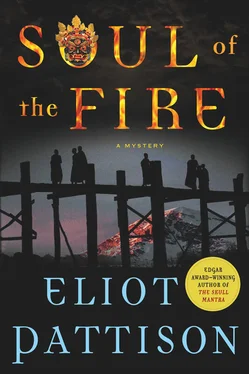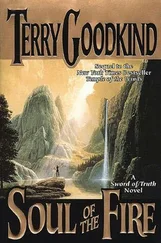Eliot Pattison - Soul of the Fire
Здесь есть возможность читать онлайн «Eliot Pattison - Soul of the Fire» весь текст электронной книги совершенно бесплатно (целиком полную версию без сокращений). В некоторых случаях можно слушать аудио, скачать через торрент в формате fb2 и присутствует краткое содержание. Год выпуска: 0101, ISBN: 0101, Издательство: St. Martin, Жанр: Полицейский детектив, на английском языке. Описание произведения, (предисловие) а так же отзывы посетителей доступны на портале библиотеки ЛибКат.
- Название:Soul of the Fire
- Автор:
- Издательство:St. Martin
- Жанр:
- Год:0101
- ISBN:9781250036476
- Рейтинг книги:4 / 5. Голосов: 1
-
Избранное:Добавить в избранное
- Отзывы:
-
Ваша оценка:
- 80
- 1
- 2
- 3
- 4
- 5
Soul of the Fire: краткое содержание, описание и аннотация
Предлагаем к чтению аннотацию, описание, краткое содержание или предисловие (зависит от того, что написал сам автор книги «Soul of the Fire»). Если вы не нашли необходимую информацию о книге — напишите в комментариях, мы постараемся отыскать её.
Soul of the Fire — читать онлайн бесплатно полную книгу (весь текст) целиком
Ниже представлен текст книги, разбитый по страницам. Система сохранения места последней прочитанной страницы, позволяет с удобством читать онлайн бесплатно книгу «Soul of the Fire», без необходимости каждый раз заново искать на чём Вы остановились. Поставьте закладку, и сможете в любой момент перейти на страницу, на которой закончили чтение.
Интервал:
Закладка:
Sung blew a long plume of smoke into Shan’s face. “You are correct about one thing. There is nothing you could possibly do that will affect the outcome. You are nothing but an irritating gnat buzzing around my face. Once we celebrate our success, comrade, you will be free to leave us. Whether with or without that worn-out old Tibetan will be up to you. Back to your ditches. Just like your labor camp, except you have to provide your own meals. I should be furious with you, but all I feel is pity.”
Shan saw now a little puddle with a shimmering surface, just an indentation of a boot heel with something oily in it. As he bent to examine it, Sung flung his butt into the puddle. With a small whooshing sound, the liquid burst into flame. The guards laughed.
He sat through a long meeting of the Commission, jointly presided over by Madam Choi and Commissioner Vogel, during which another half dozen files were reviewed. Shan carefully studied each of the reports, probing the forensic results, asking about the fuel or accelerant used and the unusually detailed records of each victim’s childhood. “I am confused, Madam Chairman,” he said midway through the session. “We call these events of either individual psychosis or criminal conspiracies, yet you treat them as connected. Where are they joined?”
Choi seemed strangely puzzled by his inquiry.
The silence was broken by two words. “The poems.”
Choi’s head snapped toward Kolsang. The words were the only ones Shan had heard from the Tibetan Commissioner since the first meeting. The Chairman’s eyes smoldered but she did not acknowledge him. “That, Comrade Shan, is the essence of our responsibility, is it not? All crimes have a social context. We have been given the honor of explaining that context for the people.”
The poems . The verses still echoed in his head. How frightened they are of flames . “How many poems were found at immolation sites?” he asked. He had seen only two.
Choi glanced at Zhu, who seemed responsible for all the Chairman’s details.
“How many?” Shan pressed.
“Not at all of them,” Choi replied.
Shan looked to Zhu. “How many were written by the suicides?”
Zhu shot him a petulant glare. “Nineteen that we know of.”
The announcement took even Choi by surprise. Judson muttered something under his breath and recorded the number on his notepad. Hannah Oglesby locked her arms around her chest as if she had suddenly grown cold. Kolsang lowered his head, his eyes closed.
Choi noisily cleared her throat and began the next file.
When the Commission broke for lunch, the corridors were filling with bureaucrats filing toward the dining hall. Shan stepped into the hallway, losing himself in the crowd, then slipped into the stairwell at the end of the hall. He climbed to the now-empty top floor, the administrative floor, and found a large group office. He moved from desk to desk, tapping computer keyboards until he found a terminal whose user had not signed off. He sat down and began typing, searching for personnel records, and then, warily watching the doorway, tapped out several Internet inquiries.
A quarter hour later, he understood much more about the peculiar membership of the Commission. Madam Choi had been swiftly reassigned from a senior position in Beijing when a criminal investigation into her husband’s finances was initiated. The German Vogel, from Leipzig, had been a senior commercial attaché, running investment programs in his embassy in Beijing, but was hastily sent to work at the United Nations when a million dollars had gone missing somewhere between his embassy and a mayor’s office in Szechuan Province. Miss Zhu, the daughter of a senior Party official, had recently graduated from the prestigious Foreign Relations Academy in Beijing after four years of studying law. Kolsang served as the director of a large agricultural collective in northern Tibet and was head of the Party in his county. Xie, once married to a Tibetan woman who died prematurely, had been imprisoned for theft nearly thirty years earlier, but was rehabilitated sufficiently to earn a post in Religious Affairs. Hannah Oglesby, the American woman, had received awards for teaching modern agrarian techniques to impoverished farmers in Indonesia and Africa, then led a UN project for clean drinking water in central Tibet the year before. The American Judson had headed up UN-funded public health projects in Nepal and Tibet years earlier, then left to teach Asian religion at a university in Michigan.
He nervously glanced at the corridor, then quickly located a listing of hospitals within two hundred miles. Only four had trauma units, only two were equipped for patients with severe burns.
* * *
Shan sat by a window in the dining hall and poked at his dinner of steamed vegetables and rice. He was restless. He had tried to settle into the little studio apartment that was his assigned quarters, but he could not get comfortable. He wanted to be outdoors, on the mountainside, but his prison instincts told him he could not slip away without knowing the routine of the security patrols. He watched as constables, always in pairs, paced along the road that ran inside the perimeter of the wall. Every few seconds, he glanced at the prison glowing in the setting sun, hating himself for sitting in comfort while Lokesh suffered. The greatest torture of all was being forced to join the machine that was grinding Tibet into dust.
“Rehabilitated prisoner,” someone said over his shoulder.
He turned to see the American Judson taking a seat across from him, a cup of tea in his hand. “Back home, it brings to mind a valiant struggle to fit back into society. The stories are all tales of great personal sacrifice. The tarnished knight painfully restores his honor.”
Shan glanced at the man uncertainly. The American was the most easygoing of the foreigners, and though he did seem to enjoy goading Choi, Shan was not certain of his motives. “I have never considered myself in those terms.”
“Meaning what? No honor?” The American’s lips were curled in a grin, but his penetrating blue eyes were not smiling. “Or just no interest in fitting back into society?”
Shan busied himself with his meal, hoping the American would go away. Finally he looked up. “Tell me something, Mr. Judson. How did the foreign Commissioners get chosen?”
The American sipped his tea before answering. “Beijing set the rules. We all had to be current or former officials with the United Nations. Beijing had to verify we had never breathed a word of support for the Tibetan independence movement. We had to speak Chinese and English, pass a medical exam, and be able to spend three months in Tibet.”
“You applied for the position?”
Judson shook his head. “Didn’t know anything about it, but I got a phone call that persuaded me. I had worked in the American foreign service, then administered UN relief programs before leaving to teach at a university in the Midwest. Apparently, not many candidates came forward when they heard the posting was in Tibet. They thought I would be politically acceptable to Beijing. The university gave me a leave of absence.”
“But you had spent time in Tibet.”
Judson eyed him warily.
“You understood when I spoke in Tibetan,” Shan offered.
“One of my postings had been in Tibet. It made an excellent credential. I had diligently obeyed all the instructions of my host government,” Judson explained with a mock salute.
Shan weighed his words. “The foreign Commissioners are here as employees of the United Nations?”
Judson reached into his shirt pocket and extended a laminated card with his photo below the emblem of the United Nations. “Citizens of the world.”
“Meaning you all have diplomatic immunity.”
Читать дальшеИнтервал:
Закладка:
Похожие книги на «Soul of the Fire»
Представляем Вашему вниманию похожие книги на «Soul of the Fire» списком для выбора. Мы отобрали схожую по названию и смыслу литературу в надежде предоставить читателям больше вариантов отыскать новые, интересные, ещё непрочитанные произведения.
Обсуждение, отзывы о книге «Soul of the Fire» и просто собственные мнения читателей. Оставьте ваши комментарии, напишите, что Вы думаете о произведении, его смысле или главных героях. Укажите что конкретно понравилось, а что нет, и почему Вы так считаете.












